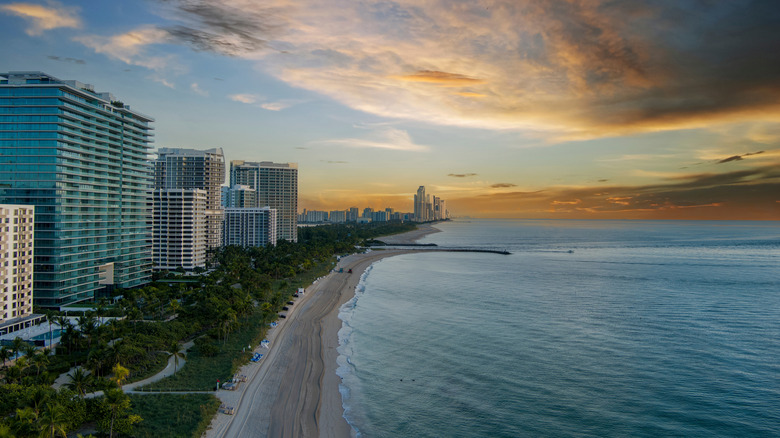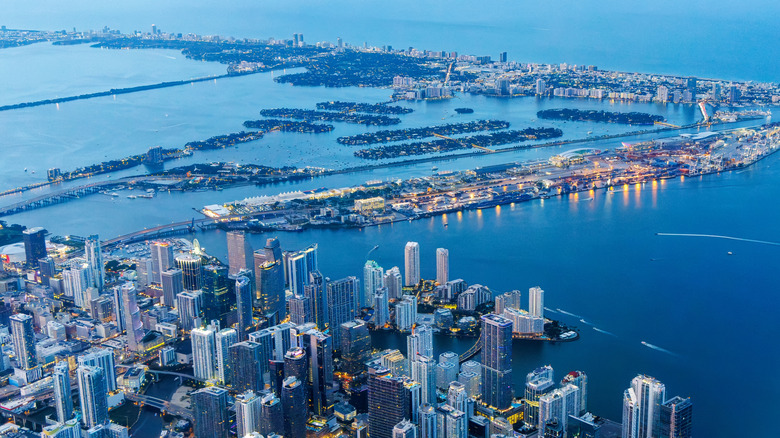The Huge Florida City That's Sinking Into The Ocean
It's sometimes easy to forget how precarious our situation is on Earth. For example, as we go about our lives, there are multiple threats to our planet from space, including gamma ray bursts, space debris (of which there's a staggering amount), and asteroid impacts. Then, there are the looming crises down here on Earth's surface, the most alarming of which is surely climate change.
Our shifting climate is already having a major impact on the world around us, but global warming will have even more of an effect in future, including a likely increase in wildfires, severe droughts, and severe flooding. All of this has prompted some pretty grim predictions about the end of the world from such eminent individuals as Stephen Hawking and Neil deGrasse Tyson, both of whom have said that humanity should probably try to set up an off-planet colony within a century or so.
Should we find ourselves in the position of having to make a speedy retreat from our home planet, we will almost certainly leave behind a world where sea levels have risen to the point some of our most beloved coastal cities will have been largely subsumed by the ocean. Massive cities are already sinking into the ocean and you might be surprised to learn which urban areas are included in this bleak list. Florida, for instance, could lose huge portions of one of its largest cities in fewer than 40 years if things continue the way they're going.
Sea levels are rising dramatically
The most populous city in Florida is Jacksonville, with an estimated population of 985,843. While Jacksonville will feel the effects of climate change, Miami, in the south of the state, will face even more of a crisis. Miami is the second-largest city in Florida, with 455,924 people living in the coastal metropolis. As such, it is poised for a battering as climate change continues to affect sea levels.
Those levels are rising globally as a result of melting ice sheets in the North and South Poles, which is in turn caused by rising global temperatures heating the seas. Propelled by the burning of fossil fuels, which produces CO2 that is then transferred to the ocean, global warming will ultimately lead to devastating consequences for all, but coastal towns are set to take a major hit from the resulting sea level rise, with Miami in particular looking at a major loss of its land.
According to a 2022 report led by the National Oceanic and Atmospheric Administration (NOAA) the U.S. coastline will see up to a foot of sea level rise by 2050. This is as much of a sea level rise in 30 years as the world has seen in the last century, and unless emissions are drastically reduced, the sea level will increase by at least two feet by 2100. This projected rise will vary in different regions depending on the specific height of land, and is expected to not only result in a loss of land but a profound increase in the frequency of coastal flooding. Miami, and the Miami-Fort Lauderdale metropolitan area are, unfortunately, right in the firing line.
Miami is ground zero for the effects of global warming
The Miami-Fort Lauderdale metropolitan area is the fourth largest urban area in the United States and contains more than 6 million residents across its municipalities. Its location on Florida's southern tip has ensured the city has become a major international trade, tourism, and immigration hub, but it's this location that also puts Miami in a very precarious position in terms of climate change.
More than half of Miami-Dade County is less than 6 feet above sea level, which means it is primed to feel the effects of rising sea levels in the coming decades. In fact, up to 60% of the county could be underwater by 2060. This grim prediction comes from University of Miami Professor of Geography and Sustainable Development, Harold Wanless, who told CBS News in 2022 "the tide is coming in and eventually it's not going to go back out."
The county itself is just as pessimistic about its future. For planning purposes, the county uses the Southeast Florida Regional Climate Change Compact's Unified Sea Level Rise Projection which projects that by 2040 sea levels will rise to between 10 and 17 inches higher than they were in the year 2000. Meanwhile, a report from the county notes how the effects of sea level rise have been observable within just that last 10 years, with places that used to flood once or twice a year now flooding 10 or 12 times. The report also notes how rising sea levels exacerbate existing risks from flooding including saltwater intrusion, shoreline erosion, and flooding from canals.
Miami is expanding while it's sinking
Miami-Dade County might be taking the impact of sea level rise seriously, but the city of Miami is forging ahead with expansions that are right in the path of future sea level incursions. Luxury high-rise developments are being constructed directly on the waterfront in the city and Miami has more than $400 billion worth of real estate exposed to flood risk. This is more than any city in the world. As such, should sea level rise continue at the rate expected by NOAA, Miami stands to be hit hardest, especially since it is continuing to rapidly expand its waterfront real estate.
It doesn't help that several of these luxury beachfront properties are already sinking and that this expansion of property is partly to blame. A study published in Earth and Space Science found that 35 high-rise condos and luxury hotels on Florida's barrier islands were sinking by 0.8 to 3.1 inches. While the researchers attributed this to deformation of the sandy layers within the limestone beneath each structure, mostly caused or increased by nearby construction, they also urged that monitoring is needed "especially in coastal areas with corrosive environmental conditions."
As the Miami Herald reported at the time, experts warned about the impact fossil fuels were having on the climate and the effect this has on rising sea levels and therefore the stability of Miami-Dade's barrier islands. All the while, new construction is underway, however, this will remain a major concern.



